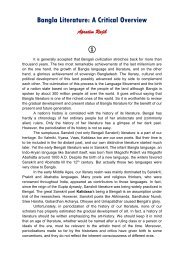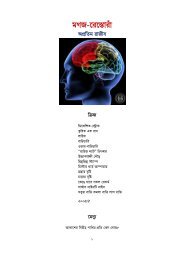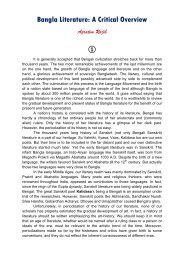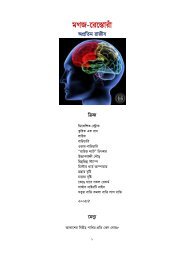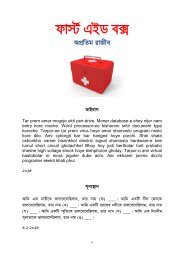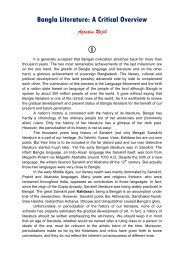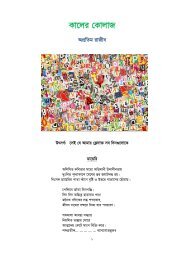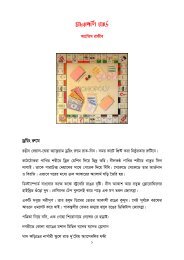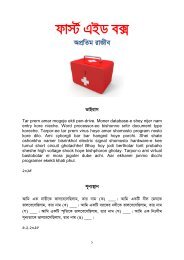Literature-Critique
Create successful ePaper yourself
Turn your PDF publications into a flip-book with our unique Google optimized e-Paper software.
35<br />
“Monihara” is the story of Monimala, a complex woman whose selfcenteredness<br />
is the outcome of her alienation from her husband. All that she cares<br />
for is her ornaments. As a result, being requested by her husband to give him the<br />
ornaments, she flees with her distant cousin and thereafter becomes his victim. Her<br />
ghost now haunts her husband’s mind. The ghost appears being adorned with the<br />
ornaments that Monimala took for herself. It is the ghost of a woman of conservative<br />
Bengali society, who was forced to live a loveless marital life and whose heart was<br />
thereby falsely glittering like golden jewelries.<br />
“Malyadan” is the story of an undesirable love-game played by elders with an<br />
under-aged girl, which results in bitter consequences.<br />
In “Guptadhan” we come across a man who spends a large part of his life for<br />
hidden treasure and finally returns home barehanded forsaking his greed for riches.<br />
“Balai” is a unique story. Here the writer depicts a boy whose heart is full of<br />
admiration for a tree. This boy gradually grows up as a nature lover. And the sad<br />
happening of uprooting that tree separates him from his beloved kith and kin.<br />
“Laboratory” is a story of self-righteousness of modern women – a story of<br />
contradiction between freedom and ruthlessness. The laboratory of the story is in<br />
fact a lab of humans’ dark mind intended for animalistic sexual practice.<br />
Tagore’s dramatic works are diversified, but the ultimate fact appearing from<br />
those works is that he is a poet; because he wrote his plays in stilted language, and<br />
often in verses.<br />
In his plays, Tagore upholds humanity and criticizes all prejudices and<br />
inhuman practices prevailing in the society. In a number of his dramas, he conveys<br />
the notion that a society cannot survive without adaptations of its faiths and traditions<br />
with the demand of time.<br />
In the famous verse-drama Bisharjan (Emulsion), he draws the conflict of love<br />
and convention through a story of making human sacrifice at a temple.<br />
His Chitrangada is a beautiful verse-drama; here he shows the conflict of<br />
physical beauty and inherent competence of the female. The ugly princess<br />
Chitrangada worships to the love-god to lend her appealing beauty for a year in<br />
order to impress prince Arjuna. Her wish becomes fulfilled as Arjuna marries her, but<br />
he leaves her when after a year her god-gifted beauty disappears. Then the princess<br />
recognizes that beauty as her own antagonist.<br />
His mystic thoughts are exposed in the metaphorical plays Raja (The King)<br />
and Dakghar (The Post-office). Dakghar tells us of man’s dream for a union with the<br />
cosmic soul. A boy dreams of becoming a runner, as he wishes to carry news to all<br />
corners of the world. When the king of the world decides to meet him, he plans to<br />
ask the lord to make him a cosmic runner. However, before his departure, a girl<br />
expresses her love for him. Thus a mystic boy, who is on the way of the great world,<br />
does not lose his entire existence in this earth.<br />
In Muktadhara (The Unbound Stream), a symbolic play, Tagore shows the evil<br />
nature of civilization in an emerging age of mechanical technology. A king builds a<br />
dam in a river to gratify his vengeance against another kingdom. Then the prince, the<br />
son of the king, sacrifices his own life in order to destroy the dam and make the river<br />
water free-flowing.



